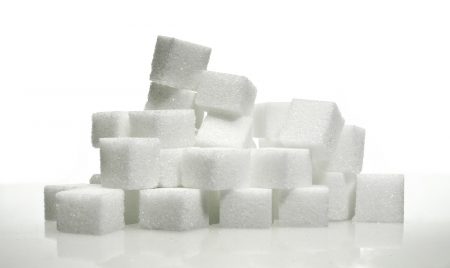
A challenge – 30 days with no sugar
Today I would like you to take up a small challenge – 30 days with no sugar. Are you in?
Some time ago I took up the no-sugar challenge with my Healthy Team, and we bravely kept up avoiding sweets for 30 days and limiting all products containing sugar to the minimum. I have great memories of that time. I remember that most of us felt much better and we also has more energy. Some even noticed a noticeable weight loss. What’s more, this challenge let some of us get rid of addiction to sweets.
It’s been a long time since we last took up the no-sugar challenge. That’s why I think it’s time to go back to life with no sugar again, even if it’s only 30 days!
Why?
Because sugar is the source of empty calories, it doesn’t contain any nutrients, vitamins or minerals. Consuming it in large quantities promotes weight gain and as a result increases the amount of adipose tissue. It is true that glucose is the basic source of energy for the cells of our body, however, excess sugars in the diet may also cause a deterioration of our health. Sugar intake not only increases the risk of developing caries, but also contributes to the increase in triglycerides in the blood serum. Ingestion of a large amount of simple sugars is particularly dangerous for people with diabetes, because it can lead to significant fluctuations in glucose levels and cause hyperglycaemia. Consuming refined carbohydrates also increases the risk of acidifying the body.
Excess sugars may also promote the growth of Candida yeasts. We must also remember that sugar is addictive and we will need more and more of it! In extreme situations, this addiction is as difficult to get rid of as addiction to alcohol. You can find more information about dependence on sweets here.
Should we limit all carbohydrates?
Of course, you can’t cut out all carbohydrates, but try to choose the healthy ones! Carbohydrates are divided into simple and complex. The source of simple sugars are primarily sweetened carbonated drinks, sweets, cakes, cookies, sugar and we should stay away from them. We should also reduce the consumption of products from white flour or white rice. I also advise to give up during the challenge other forms of simple sugars, like those in fruit or honey. Complex carbohydrates can be found in whole grain cereal products, thick groats, cereal flakes or bran. In addition to the fact that these products contain carbohydrates, they are also a source of dietary fiber, contain a number of vitamins (eg from group B) and minerals (eg zinc, copper, magnesium). These carbohydrates should be included in our daily diet as much as possible.
To sum up, the products you should avoid are:
- sugar and other sweeteners
- honey and other syrups
- jam, marmalade or conserve
- chocolate
- sugary carbonated drinks
- sweets (cookies, cakes, sweets, bars)
- nectars, juice, drinks
- fruit with high fructose content (read below which ones these are)
- dairy products like fruit yogurt
The content of fructose in fruits
Low fructose fruits (allowed):
- grapefruit
- lemon
- papaya
- cranberries
- acerola
- watermelon
- peach
- nectarine
- apricot
High fructose fruits (not allowed during the challenge):
- dates
- raisins
- dried figs
- dried apricots
- grapes
- cherries
- bananas
- pears
Did you know that …
A can of cola contains about 6 teaspoons of sugar
A cup of fruit yogurt contains about 6 teaspoons of sugar
A portion of ketchup contains 2 teaspoons of sugar
That is real food for thought, isn’t it?
Unfortunately, many of us don’t realize how many simple sugar we really consume because we don’t always read the labels, and we don’t add up all the simple carbs we eat with our food.
Will you take up the 30-day no-sugar challenge with me? Let’s go!!!

References:
1: Chow KF. A Review of Excessive Sugar Metabolism on Oral and General Health. Chin J Dent Res. 2017;20(4):193-198. doi: 10.3290/j.cjdr.a39218.
2: Breda J, Jewell J, Keller A. The Importance of the World Health Organization Sugar Guidelines for Dental Health and Obesity Prevention. Caries Res. 2018 Aug 7;53(2):149-152. doi: 10.1159/000491556.
3: Ebrahimpour-Koujan S, Saneei P, Larijani B, Esmaillzadeh A. Consumption of sugar sweetened beverages and dietary fructose in relation to risk of gout and hyperuricemia: a systematic review and meta-analysis. Crit Rev Food Sci Nutr. 2018 Oct 2:1-10. doi: 10.1080/10408398.2018.1503155.
4: Momin SR, Wood AC. Sugar-Sweetened Beverages and Child Health: Implications for Policy. Curr Nutr Rep. 2018 Oct 3. doi: 10.1007/s13668-018-0249-7.
5: Park S, Ayala GX, Sharkey JR, Blanck HM. Knowledge of Health Conditions Associated With Sugar-Sweetened Beverage Intake Is Low Among US Hispanic Adults. Am J Health Promot. 2018 Jan 1:890117118774206. doi: 10.1177/0890117118774206.
6: Zheng M, Allman-Farinelli M, Heitmann BL, Rangan A. Substitution of sugar-sweetened beverages with other beverage alternatives: a review of long-term health outcomes. J Acad Nutr Diet. 2015 May;115(5):767-79. doi: 10.1016/j.jand.2015.01.006.










Comments No Comments
Join the discussion…